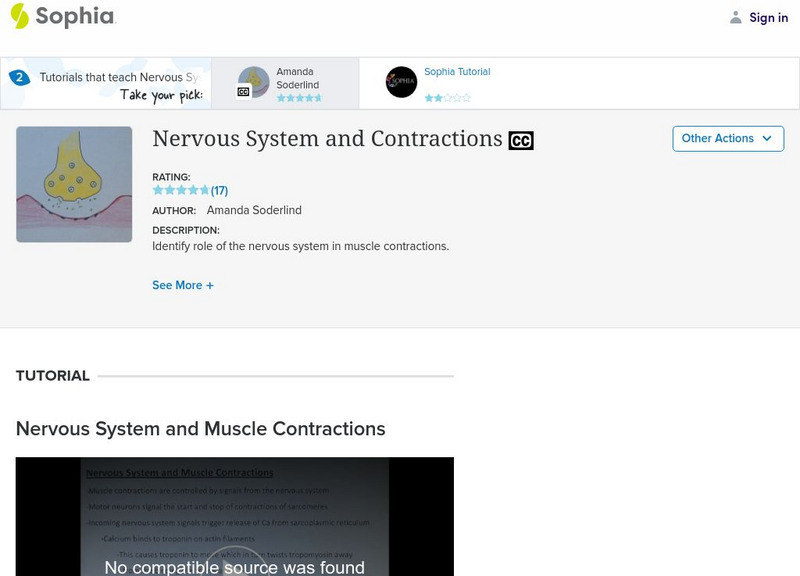SciShow
The Neolithic Diet: New Details About What's in the Iceman's Stomach
An analysis of samples taken from the Iceman’s stomach has revealed new details about what people were eating thousands of years ago!
Amoeba Sisters
Muscle Tissues and Sliding Filament Model
Join the Amoeba Sisters a they explore different muscle tissues and then focus on the sliding filament theory in skeletal muscle! This video also briefly talks about muscle naming, some vocabulary (such as agonists and antagonists)...
Crash Course
Big Guns: The Muscular System - CrashCourse Biology
Hank tells us the story of the complicated chemical dance that allows our skeletal muscles to contract and relax.
Institute of Human Anatomy
What EXACTLY Are Muscle Knots? And Why Do They Happen?
In this video, Justin from the Institute of Human Anatomy discusses the mysteries surrounding muscle knots.
Catalyst University
Events of Excitation-Contraction Coupling [Part 1]
In this video, we will discuss the events of Excitation-Contraction Coupling from the motor neuron action potential to release of Ca2+ from the sarcoplasmic reticulum (SR). **Part 2 Coming Soon
Catalyst University
Sarcomerogenesis | Adding Sarcomeres in Parallel & Series
In this video, we discuss the mechanisms by which sarcomeres can be added or removed from skeletal muscle myofibrils: in parallel or in series.
Catalyst University
Excitation-Contraction Coupling in Skeletal Muscle [Part 2/2]
Part 2 of 2 of excitation-contraction coupling | In this video, we discuss excitation-contraction coupling from opening of calcium channels in the sarcoplasmic reticulum (SR) all the way through cross-bridge cycling between actin and...
Science360
STRUT YOUR STUFF
In episode 52, Jordan and Charlie discuss research discovered using new high-resolution microscopy by a team at the University of Pennsylvania. Molecular struts, called microtubules, interact with the heart's contractile machinery to...
Catalyst University
Muscle Physiology: Regulatory Proteins; Tropnin and Tropomyosin
Muscle Physiology: Regulatory Proteins; Tropnin and Tropomyosin
Curated Video
Muscle Contraction Made EASY: What REALLY Happens During Exercise
How do muscles actually contract? There's a lot involved in the process. And in this video, we talk about muscle contraction at the molecular level. We'll discuss sarcomeres, actin, myosin, the muscle action potential and the roles of...
Curated Video
042 How Calcium ion release results in Muscle Contraction
In this video, I show how the release of Calcium ions from the sarcoplasmic reticulum results in skeletal muscle contraction at the level of the sarcomere. Enjoy
Curated Video
041 An Introduction to Skeletal Muscle Contraction
In this episode, I start talking about skeletal muscle contraction, by giving a general introduction into how muscle contraction happens. I deal with how the action of actin and myosin in the sarcomere results in movement. Enjoy!
Curated Video
043 The details of Muscle Contraction
In this video, I go into the nitty gritty details of how muscle contraction works at the level of actin and myosin in the Sarcomere. I deal with words like troponin and tropomyosin, sarcoplasmic reticulum and Terminal Cisternae. Fun...
Curated Video
Muscles for Locomotion - Section 34.3
What would the skeletal system be without muscles to move our bones. Muscles are an essential part of what makes us humans and in this lecture, I talk about the three types of muscle, and more importantly, how they work. How does muscle...
Catalyst University
Muscle Physiology: Troponin, Tropomyosin, and Myosin Cross-Bridge Cycle
Muscle Physiology: Troponin, Tropomyosin, and Myosin Cross-Bridge Cycle
Catalyst University
Exercise Physiology | Skeletal Muscle Length-Tension Relationship
Exercise Physiology | Skeletal Muscle Length-Tension Relationship
Catalyst University
The Sliding Filament Mechanism EXPLAINED! - with Animation
In this video, we will discuss the structure of the sarcomere and see how that relates to sarcomere shortening (with animation).
Professor Dave Explains
Types of Tissue Part 3: Muscle Tissue
With epithelial tissue and connective tissue down, it's time to learn about the third type of tissue, and that's muscle tissue. This makes up all the muscles in our bodies, and it comes in three types. Those are skeletal muscle, cardiac...
Professor Dave Explains
The Mechanism of Muscle Contraction: Sarcomeres, Action Potential, and the Neuromuscular Junction
We've learned about the types of muscle, including skeletal muscle, and we know then when these muscles contract, we are able to move our bodies around. But how exactly does this happen on the molecular level? There is an astonishing...
Curated OER
The Muscular System
Muscles and the chemicals myosin and actin are described in the sliding filament theory by Paul Andersen using pictures on his Smart Board. Give your young scientists a clear idea of muscle contraction by showing this video.
Khan Academy
Anatomy of a Muscle Cell
Previous videos have dealt with the proteins that produce mechanical motion and how nerves stimulate contraction. But this presentation explains, on a gross anatomical scale, how skeletal muscle is structured.
Curated OER
Skeletal Muscle Structure
Skeletal or striated, muscles are shown down to the chemical components. All the fibers that make up a muscle cell are described and animated. Use this to illustrate the parts of skeletal muscles for your anatomy or biology classes.
Sophia Learning
Sophia: Nervous System and Contractions: Lesson 1
This lesson will investigate the role of the nervous system in muscle contractions. It is 1 of 4 in the series titled "Nervous System and Contractions."





